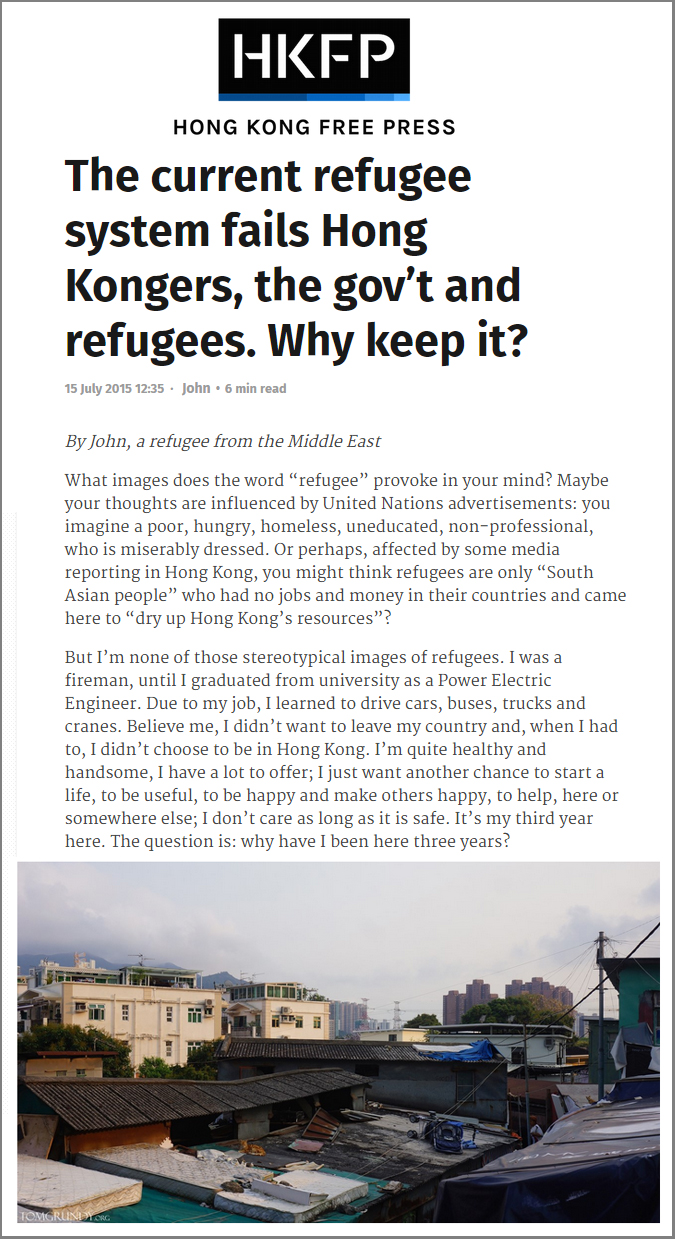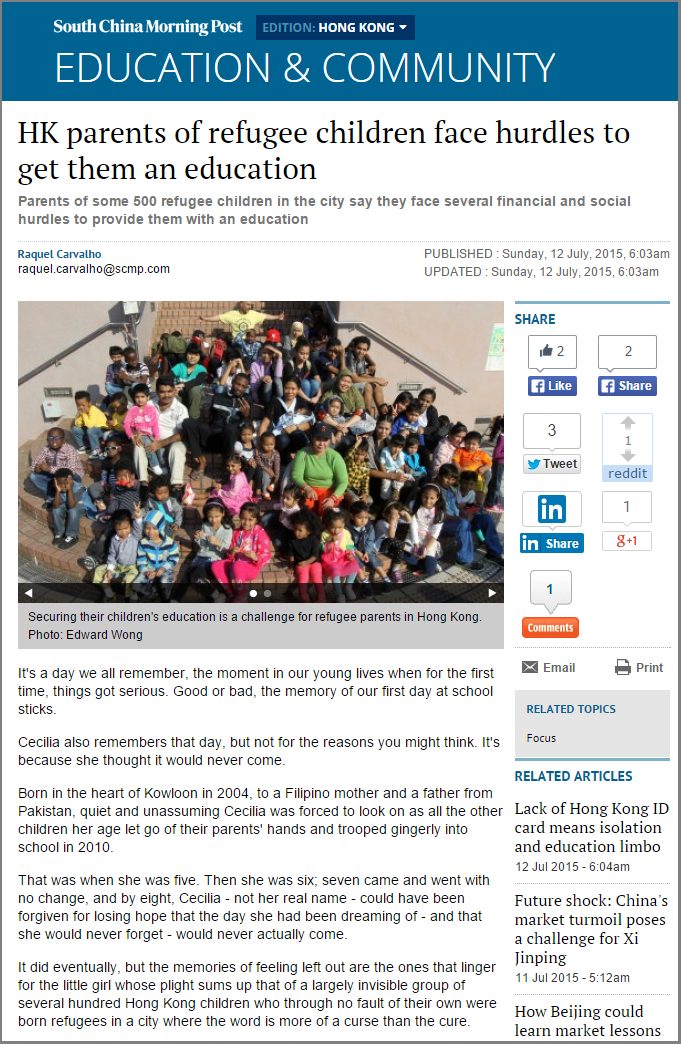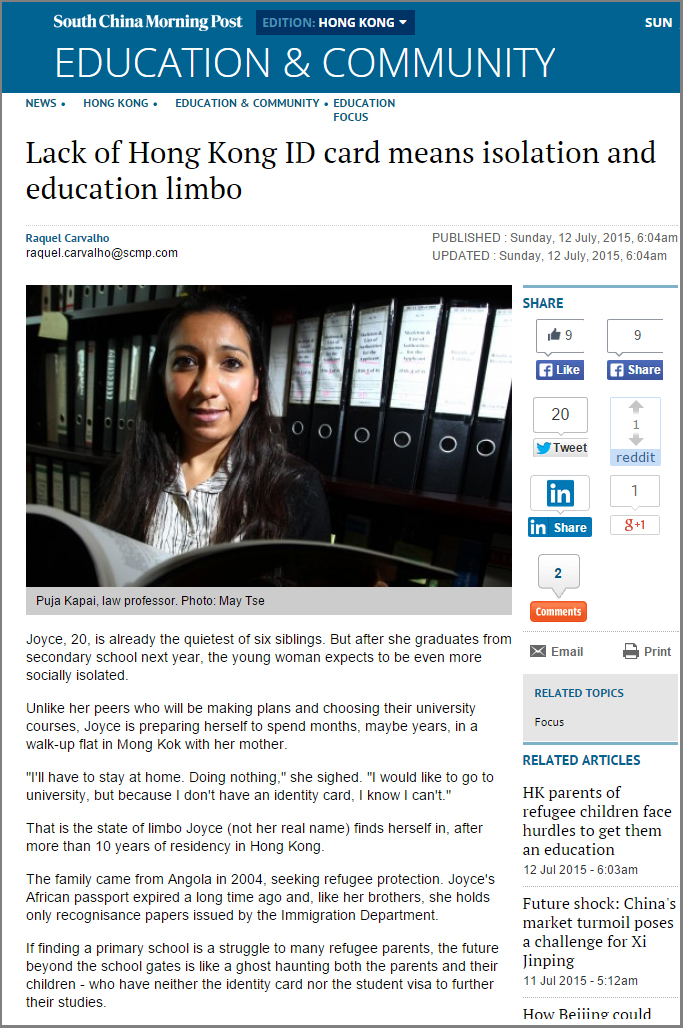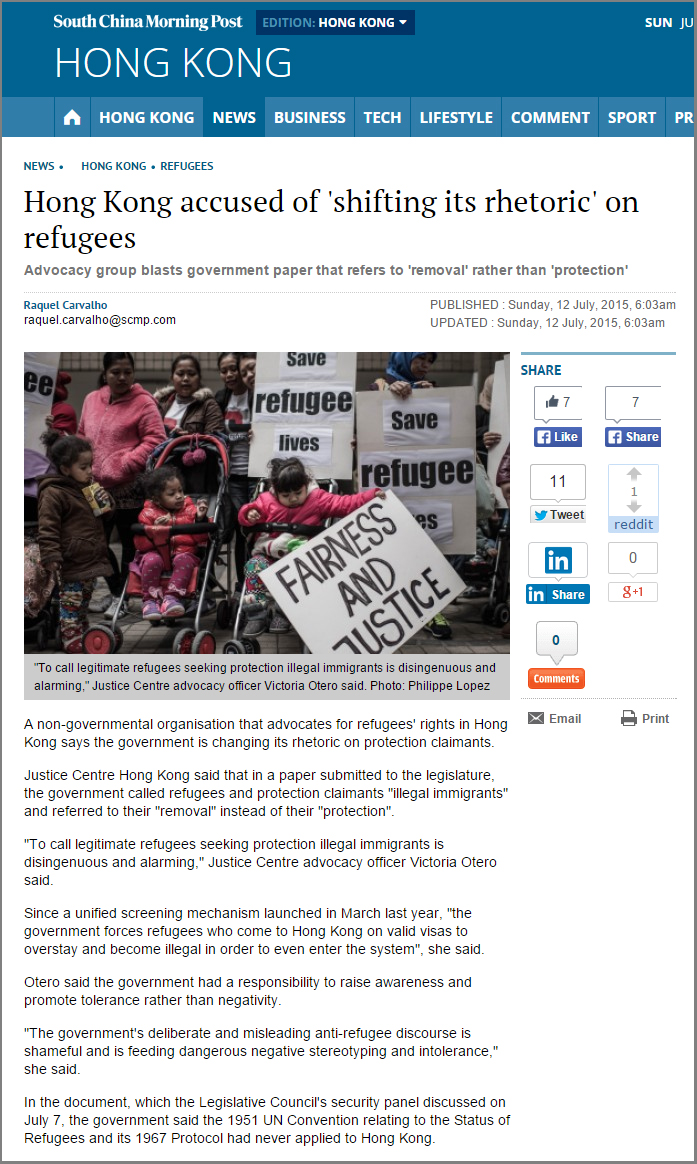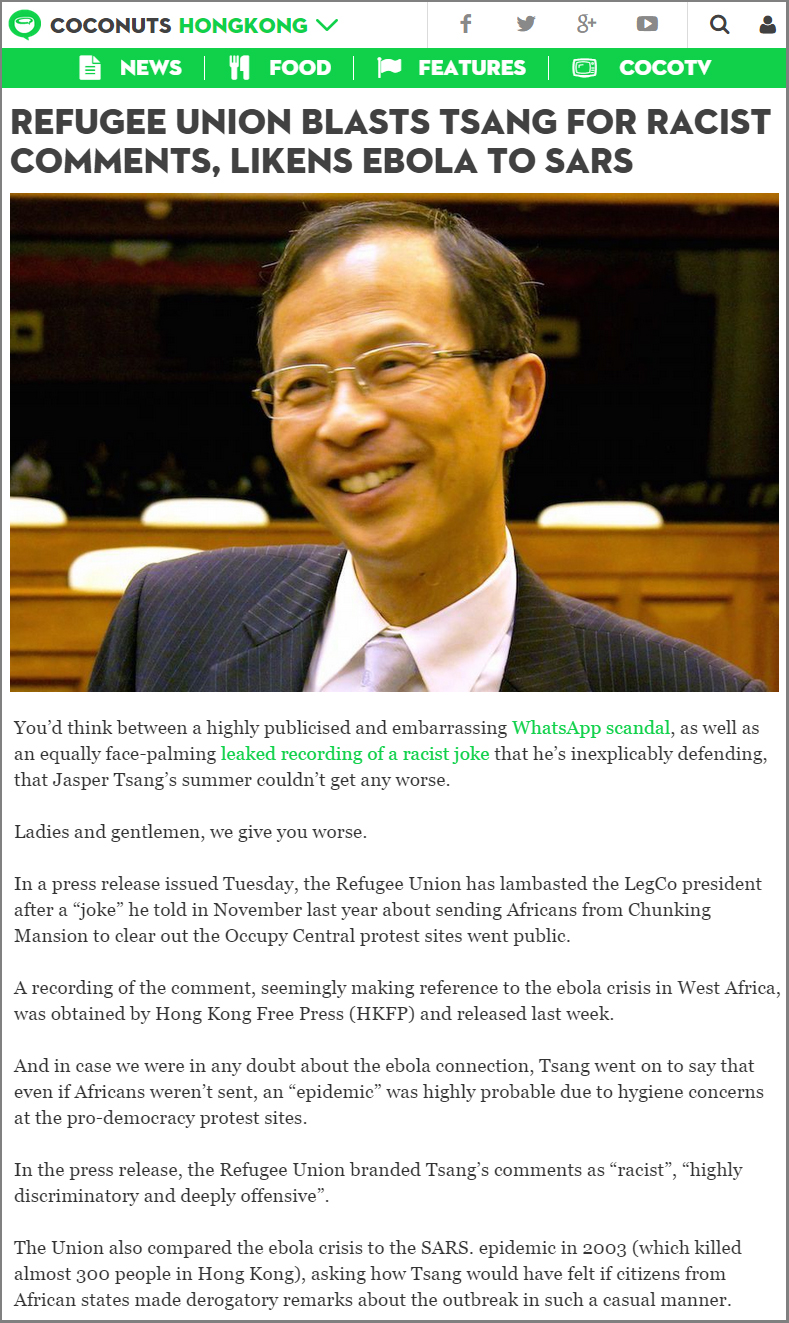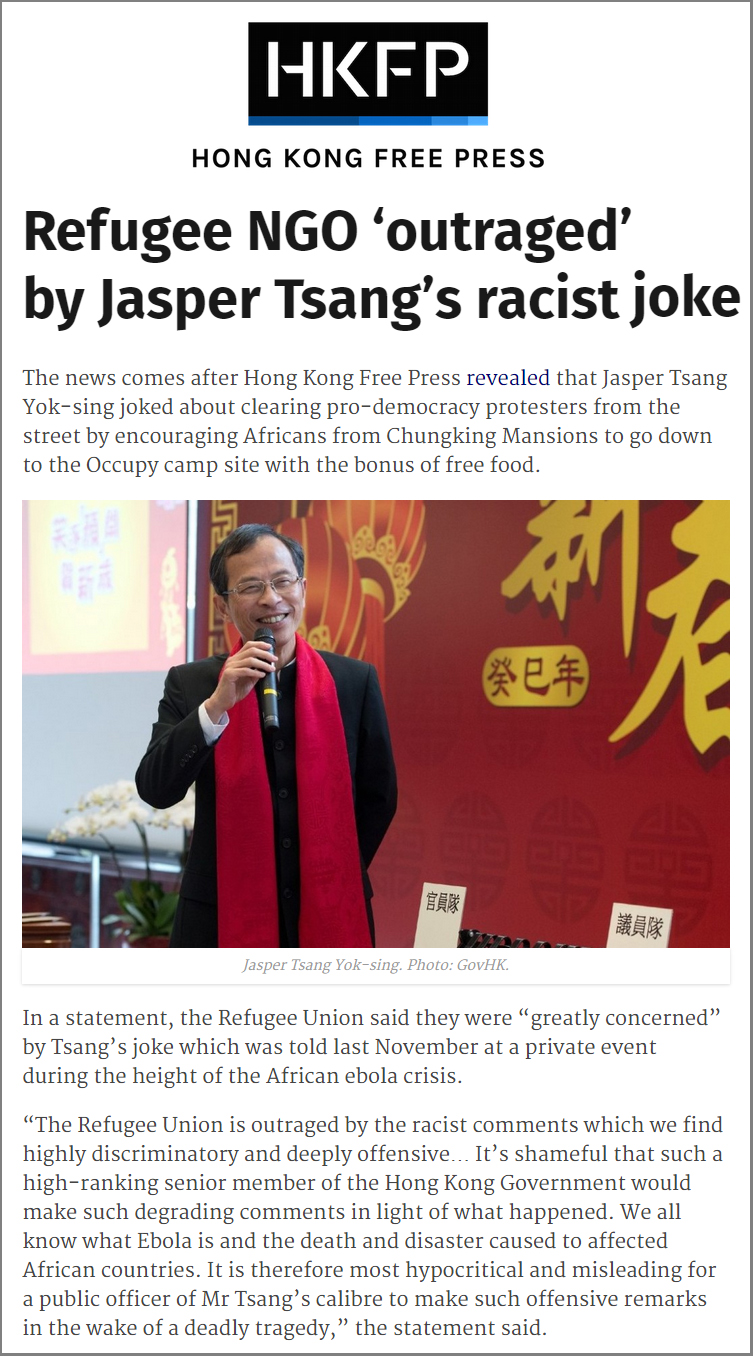Inside prison I work for the government
Jul 22nd, 2015 | Crime, Housing, Immigration, Personal Experiences, Welfare | Comment
I am scarred because I don’t want to go back to prison. I was sentenced to 15 months for working to support my family, but I didn’t do anything criminal. In my mind, it was political persecution because refugees don’t have a straight road to walk. We go the wrong way because we don’t get enough assistance. We work to pay rent and buy food, but the police arrest us for “unlawful employment”.
I am a South Asian refugee mother with two daughters. Honestly I tell you, it is impossible for us to live with 3000$ rent and food coupons. Refugees need cash for many things, like going to the market and buying Pampers, clothes and school supplies. That is why we must do part-time job for our families in the day to day struggle. Also, my mother back home is sick, but I have no money to help.
In 2012, I was arrested at a fish restaurant in Tuen Mun. The police catch me and my offence is taking unlawful employment. Now I wish to unburden myself and tell the truth that the judge did not consider. The ISS assistance did not pay my full rent and utilities. I have no husband so I have to worry about my girls and everything I have to buy for them. That is why I have to do work before and now.
I tell my problems to my case officer but she cannot help. “This is the rules”, she always tells me so I know that I have to find a way by myself. If the landlord kick us outside, what will happen to my girls? My friend introduced me to a boss who paid me 400$ to wash dishes all day. There is other work for women, but it is not acceptable for me because it is very dangerous and I have children.
Why inside prison have so many refugees working? Many resident prisoners refuse to work, or have mental problems, or do drugs before. Refugees are strong and hard-working. Inside prison we work for the Government of Hong Kong, for example, washing and ironing uniforms and hospital sheets. They pay us 5$ a day and get cheap labour from thousands of men and women refugees who cannot work outside. Why does it happen like this?
Before I am outside and I work for my family. When police catch me they send me to prison. Then I am inside prison and I work for the government. But still I am working: outside it was illegal because I cannot help the government, but inside it is legal because I can help the government. Would it be fairer for Immigration to let refugees work outside to buy what we need and not do crime?
Inside prison I cannot refuse to work because the officers shout at me. I must do the jobs that they give me all the morning and afternoon, also on Sunday. So please tell me if this is fair to refugees? Outside I cannot do work, but must survive without enough assistance. Inside I must do work like a slave for the Government for 15 months without a holiday and without choice. Is this right?
I don’t want to go back to prison. The police tell me that if catch again, next time they will fine me 50,000$ and put three years in prison. Now I don’t know how I can buy something that my daughters need. Every day and night I am going mentally sick and depression. Refugees are always scared of going to prison, even if their children are born on Hong Kong land and never see their parents’ country.
Also refugees have dreams for their future. I want a safe and healthy life for my children. I want them to be happy and not suffer like this. But what can I offer them? We cannot go back to my country and Hong Kong does not let us stay. I dream of a better future when I can do something good for children, because today they suffer too much.
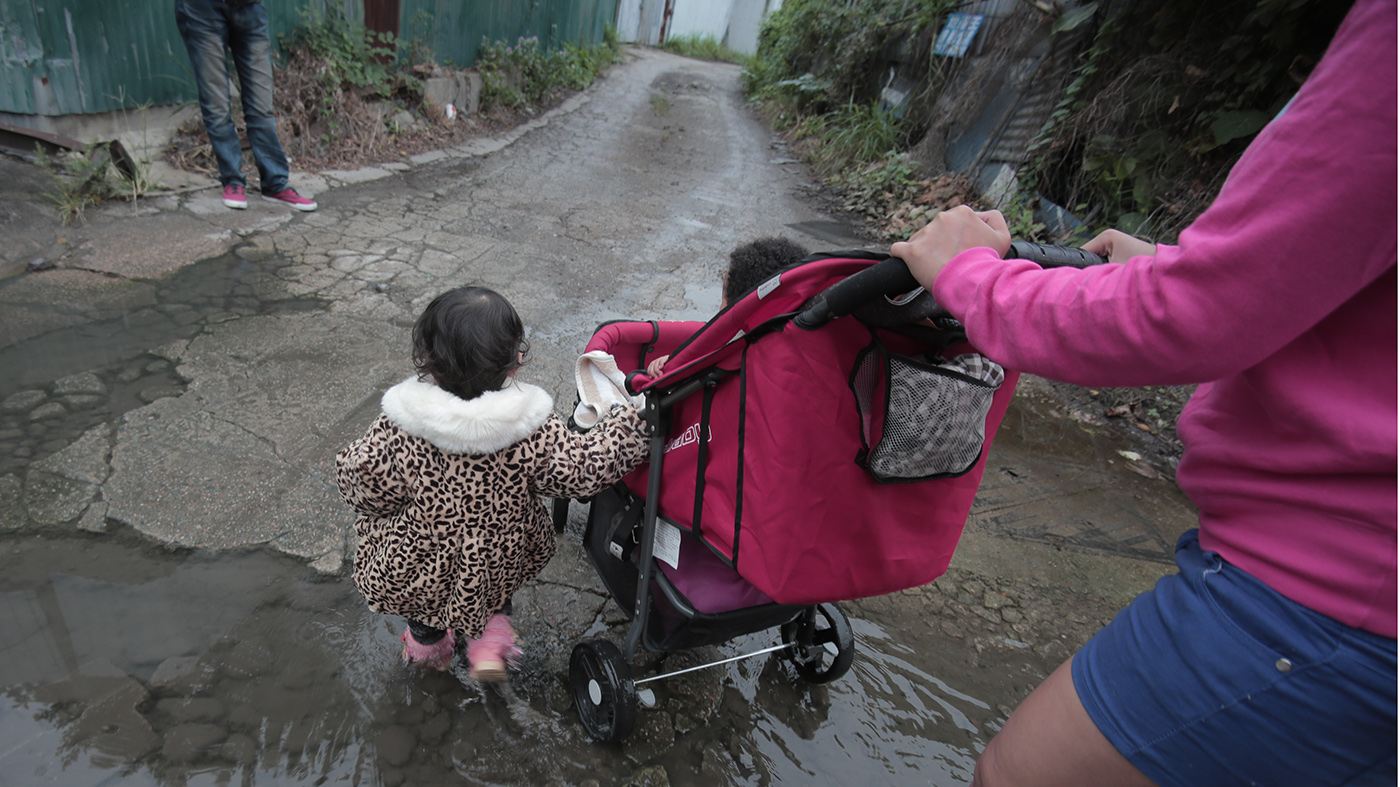
Ahmadiyya community seeks empowerment by Vision First
Jul 17th, 2015 | Advocacy, Immigration, Personal Experiences, Rejection | Comment
Rashid, 45, fits immigration profiling that perpetuates the department and city-wide culture of rejection: he is Pakistani and was convicted in 2001 for possessing a fake ID card; he was deported, but returned illegally in 2007 by speedboat; he overstayed 7 years before VF arranged his surrender to Immigration; he admits to working illegally to make ends meet and send money to family members who depend on him.
The question is: Is Rashid abusing the asylum process?
“If we can see the moon tonight then Ramadan is finished, otherwise we shall wait one more day,” explained Rashid as he welcomed us into a peaceful village compound for the Eid festivity that marks Ramadan’s end. Rashid belongs to the Pakistani Ahmadiyya minority. The community president explained the religious persecution, “Ahmadis were formed in 1889 in India from a Sunni branch. In 1903 the center was moved to Punjab and we are now based in 206 countries, with our Chief Imam in exile in London. In 1974 the Pakistani government amended the constitution and declared Ahmadis non-Muslim sparking discrimination, persecution and murders, often instigated by firebrand mullahs who preach that killing Ahmadi is a pious act rewarded by virgins in Heaven!”
When the family fled persecution and violence, Rashid came to Hong Kong, while his wife and children fled to Thailand. They were eventually recognized as refugees by the UNHCR in Bangkok and resettled to the Unites States. The heartbroken father explains that other relatives also gained refugee status in the UK and Canada. He explains that “Before there were 250 Ahmadiyya refugees in Hong Kong, including children. Now we are only 70 as many moved to other countries with the help of UNHCR, or through private sponsorship. There is no future for our people in Hong Kong.” The Unified Screening Mechanism (USM) seems to have worsened their prospects.
“We need to empower our community,” Rashid requested, “because the UNHCR is closed and Hong Kong Government does not understand or accept us. Our community is persecuted to death and Immigration tells us to move to live in other cities in Pakistan. How is that possible? Our passports and ID cards state we are “Ahmadi” and there is no safety anywhere after you name is on the kill list. Those who murder us are celebrated … even by the police!”
An agitated elderly member interrupted, “Immigration rejected my claim! They said that false police charges are a personal problem and I should have complained to other department, as written on some website. What good is that? My neighbours attacked us to steal our family business because I am Ahmadi. No other reason! The police took no action to stop them and then made false charges to arrest me. Since the (anti-Ahmadiyya) Ordinance thousands have been murdered. I had to escape to save my life. That is the truth!”
After sharing a prayerful moment, the community leaders asked about Vision First’s activism and empowerment they had heard about from a handful of active members. The president encouraged the development, “The Ahmadis are known for being peaceful. We don’t believe in strikes. Instead we pray that Allah will change our enemies’ hearts. But today we understand we need organization because Immigration does not understand our problems. We wish to provide our documents and evidence to explain the religious persecution we suffer in Pakistan. We live in exile here.”
The president recently learned a lesson about dealing with Immigration. He reported, “We applied for a visa for an Imam as the community needs religious teaching. But Immigration refused three times. After we contacted a lawyer and he threatened to go to court, Immigration wrote back that it was not necessary and the application would be accepted in seven days. Three days later the visa was issued! So we understand that without pressure it is hard to win in Hong Kong.”
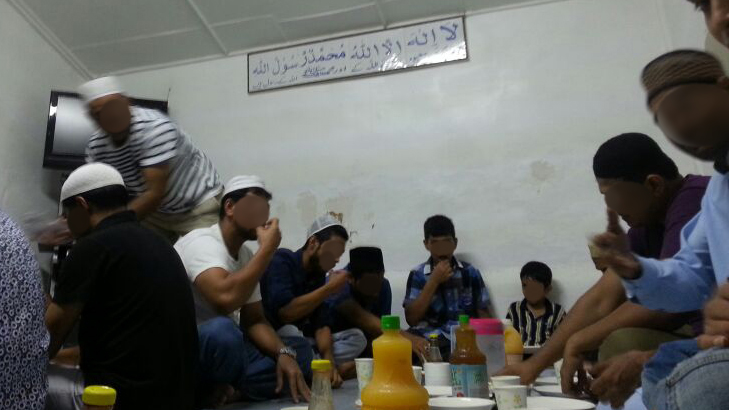
The current refugee system fails Hong Kongers, the gov’t and refugees
Jul 17th, 2015 | Media, Personal Experiences, Rejection | Comment
Enrollment deadlines force refugee parents to struggle
Jul 16th, 2015 | Personal Experiences, Schooling, VF Opinion | Comment
Financial stress surges in July for refugee parents forced to meet school enrollment deadlines for their children. An African mother explains her predicament, “Hong Kong says it provides an education for refugee children, but it’s misleading. If they said, ‘Here is the school, here are the books and uniform, go to school’, then it would be true. But we must find thousands of dollars or our children stay home.”
This mother was recognized as a refugee in Hong Kong, which makes no difference in the clash with the bureaucratic mindset of Hong Kong Government. Last year, Abby (not her real name) only had two of three children in school because she was unable to raise enough money. “I home-schooled my youngest daughter because the donor offered only enough for two”.
According to a recent report by the South China Morning Post, among 9,940 individuals seeking asylum in Hong Kong, 504 are minors and 269 were born in Hong Kong. While an unknown number is below kindergarten age, the majority must attend nine years of compulsory schooling, six in primary school and three in junior secondary school. Most also attend 3 years of kindergarten which is essential to learn Cantonese for the higher grades.
With pressure to raise money in a hurry, Abby approached the UNHCR for a US$ 1,000 advance to pay for school books, uniform, shoes and enrolment fees required by the primary school. Despite a worldwide annual budget of US$ 5.3 billion, the United Nations refugee agency turned the desperate mother away empty handed. No effort was made to introduce her to a private donor either.
“Only mothers know how much they suffer for their children,” Abby remarked, “I have to give them education, but I cannot work and I have no money. I went to several charities and they said they cannot help. What am I supposed to do?”
Between July and December, refugee parents desperately need to raise money to pay for school costs (including tuition fees for kindergartens) that will be refunded in December or January by the Student Financial Assistance Agency (SFAA). The parents are not begging for donations, but for bridging loans essentially guaranteed by the SFAA, as refunds may be made to donors’ accounts. The reason for this delay is questionable. It is a huge challenge to find donors. The process again raises doubts about policies that influence refugees’ mental health and enforce precarious livelihoods.
It is indeed unreasonable that the parents of refugee children are subjected to the annual (demeaning) routine of begging for cash to comply with the Education Bureau’s payment policies. Vision First urges the government to have SFAA liaise directly with the school to either release the funds upon enrollment in July, or issue wavers for approved refugee students. Similar arrangements are made by the Hospital Authority that does not require refugee to prepay medical costs.
Residents might find it acceptable to collect SFAA grants 4 to 5 months after school starts, but it is unfair for refugee parents who are prohibited from working, receive insufficient welfare assistance and cannot avail themselves of support from wider family, social and charitable networks.
If education is the right of every child, irrespective of immigration status, then Hong Kong Government should refrain from turning it into another deterrent mechanism that “drives refugees crazy”, as Abby put it.
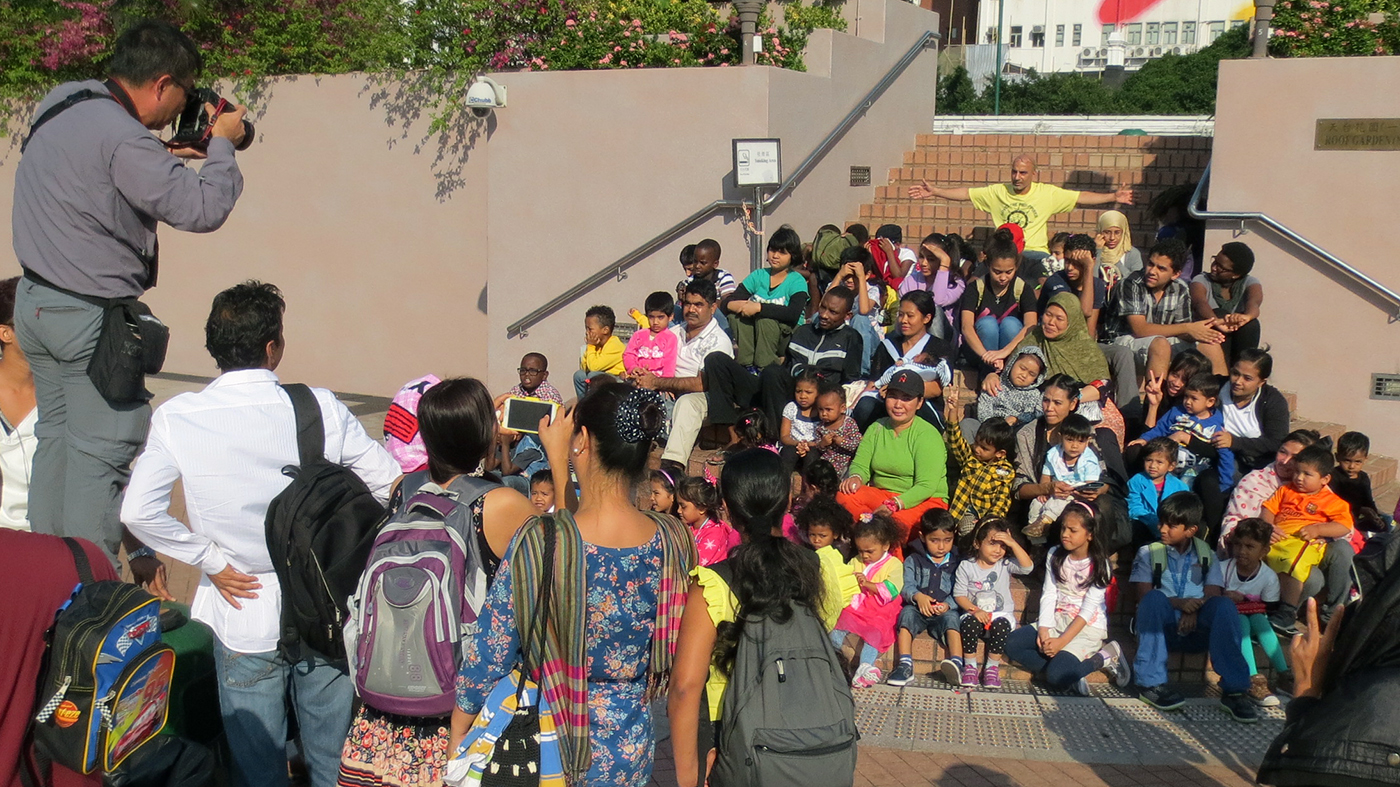
Eliminating violence in the securitization of refugee welfare
Jul 15th, 2015 | Advocacy, Crime, VF Opinion, Welfare | Comment
Vision First reported the case of a refugees in a wheelchair allegedly assaulted outside the premises of the service provider for refugees. While perhaps an isolated case, it nonetheless raises disturbing questions about the unfortunate securitization of refugee services.
First, “I came to Hong Kong as a victim of violence and here I suffer violence again,” sighed this distraught refugee as he reported being roughed up by security guards. A question may be raised as to the need for such a visible display of uniformed security guards in a setting where ‘humanitarian’ services are offered to people whose motivation for fleeing abroad relates to similar displays of an ostensible monopoly of violence. This refugee’s words brings to light the harsh confinement, subjugation and control of an underclass of 10,000 refugees, as well as what appears to be an inadequate understanding of refugee vulnerability.
Second, such an episode brings to light again questions about inadequate assistance. This refugee suffers medical conditions deemed worsened by his accommodation. And yet alternatives were not promptly offered. Behind the confrontations between case workers and refugees, behind the arguments over low assistance and high rent, and behind the swelling hatred stoked by the Hong Kong Government’s ‘humanitarian assistance’ lies the root of the problem.
Third, most evidently, if the refugee had indeed been given an appointment, why was he denied entry for hours? A structural dysfunctionality seems to exists on which Dr. Martin Luther King’s universal observation – interestingly written from inside a prison cell – may shed some light: “An unjust law is a code that a numerical or power majority group compels a minority group to obey, but does not make binding on itself. This is difference made legal.”
A refugee advocate interpreted such injustice, “I was told to find a room for 1500$, but my case officer knows it is impossible. If it were possible, why doesn’t he find it for me?” Arguably, the distribution of humanitarian assistance achieves the exact opposite of its stated objective. While it does little to prevent destitution, it dehumanizingly labels refugees as a burdensome, problematic and overly-demanding group that fails to appreciate the compassionate assistance and ostensible effort put in their care.
Faced by daily displays of emotional refugees, even security guards may lose the little empathy they had, addressing everyone with unsympathetic indifference, as tempers reach boiling point. An outspoken refugee who witnessed the wheelchair incident revealed that “The police had arrived. He was restrained and placed on the wheelchair. It was embarrassing to be a refugee. Anyone outside would see him and say ‘Refugees are crazy!’”
Fourth, it appears obvious that overly dehumanizing conditions can be either interiorized or resisted by refugees. A refugee advocate explained, “We should find a smarter way to solve our problems without giving people the opportunity to think that refugees are crazy. As refugees we should do something smart, something beautiful. Any injustice is an injustice, but it is also an opportunity for us to show it to the public.”
His words carried wisdom gained through years of imposed hardship, “We have to cure the disease, not cure the symptoms.” Focus ought to be drawn on the general context, rather than the outcome of individual behaviour, whether it is restrained and submissive, or not.
Vision First vigorously wages non-violence against social injustice, especially when sanctioned by state power in the unjust oppression of the most vulnerable in society, irrespective of immigration status.
An onerous corollary is our duty to expose and eliminate any form of violence in what, as a fifth point, can be said to emerge as the ongoing securitization of refugee welfare, manifested in the slums, food distribution, detention, criminal prosecutions, and manhandling of refugees.
Lastly, would Social Welfare Department staff shoved and pushed protesting refugees? Would the SWD condone such unwarranted conduct by its own security guards?
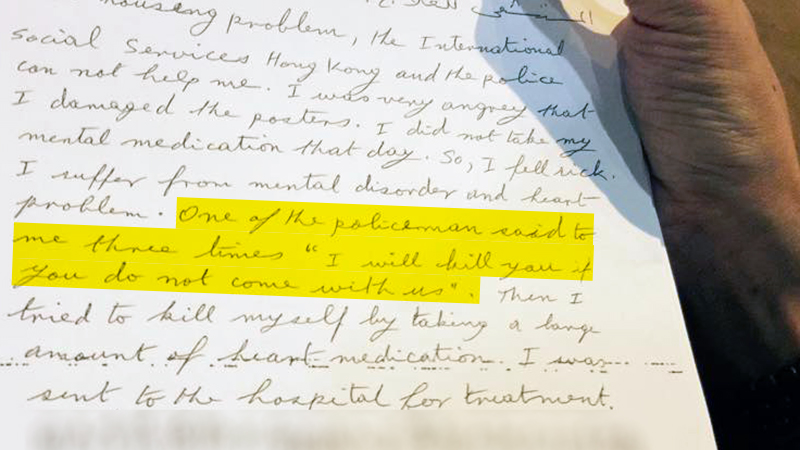
HK parents of refugee children face hurdles to get them an education
Jul 12th, 2015 | Advocacy, Personal Experiences, Rejection, Schooling | Comment
Lack of Hong Kong ID card means isolation and education limbo
Jul 12th, 2015 | Immigration, Media, Personal Experiences, Rejection | Comment
Hong Kong accused of ‘shifting its rhetoric’ on refugees
Jul 12th, 2015 | Immigration, Media, Rejection | Comment
Refugee Union blasts Tsang for racist comments
Jul 10th, 2015 | Government, Media, Racism, Refugee Community | Comment
Refugee NGO ‘outraged’ by Jasper Tsang’s racist joke
Jul 10th, 2015 | Media, Refugee Community | Comment


